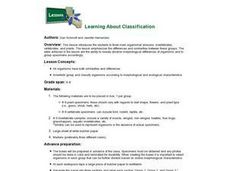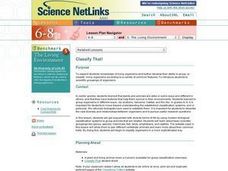Curated OER
Connecticut Wildlife: Biodiversity and Conservation Status of Our Vertebrate Populations
Students explore the different types of vertebrates found in their area. In this environmental science activity, students perform a case study on the Common Raven. They analyze data collected from research and create charts and graphs.
Curated OER
Invertebrates and Vertebrate Evolution
Students explore the major characteristics of the major animal phyla. They describe adaptive features that have contributed to the success of animals on land. Students explain how primate evolution provides a context for understanding...
Curated OER
Vertebrates And Invertebrates
In this science lesson, students classify pictures into categories of vertebrates or invertebrates. After a class discussion, students divide into groups, and are given plastic baggies that contain photographs of each. The groups must...
American Museum of Natural History
What's This? Leeches
Who actually likes leeches? Meet a scientist that makes his living letting leeches feed on him. Pupils learn about the characteristics of leeches and different variations of the species. The lesson works as a remote learning resource or...
Curated OER
Learning About Classification
Students explore the three main organismal divisions. Students classify organisms by invertebrates, vertebrates, and plants. They observe the differences and similarities between these groups.
Curated OER
Classify That!
Pupils explore diverse forms of life by using modern biological classification systems to group animals that are related. Students then study basic scientific groupings like genus, species, mammals, fish, birds, amphibians, and...
Curated OER
Animal Classification
Students watch video and slide shows as an introduction to animals. They discuss classifications of animals while moving from most common to least common of the animals. Types of classifications includes herbivores/carnivores;...
Curated OER
Have a Backone
Students create a visual organizer that describes different groups of vertebrates in this pre-writing activity. They view and discuss a video on descriptive writing and then form small groups to research vertebrate classes using the...
Curated OER
The Envelope Please
Students examine and research the importance and functions of the skeletal system in vertebrates. They construct a 10-foot geodesic dome to illustrate the importance of architectural frameworks and create a clay animation movie.
Curated OER
Science-Introduction to Mammals
Students discover mammals. In this mammals lesson, students examine pictures of mammals and their backbones. Students also feel the backbone of a guinea pig.
Curated OER
Classifying Animals
Students classify animals into vertebrates and invertebrates. In this animal classification lesson, students complete the online activity by dragging the animals into the correct groups. Students classify animals as vertebrates or...
California Academy of Science
Fish Forms
I've said it before, and I'll say it again, you can add art to any lesson! While little learners are discovering why fish have specific body parts such as, scales, fins, and gills, they start making three-dimensional fish forms. Children...
Curated OER
The Froggy Page
Learners investigate the cycle of life by observing tadpoles. In this biology lesson plan, students utilize the Internet to read stories, observe pictures, and listen to sounds of frogs. Learners create a poster board collage using...
Curated OER
Raising Trout
Learners investigate the life cycles of fish as they observe a trout's life in class. In this fish life instructional activity, students create a proper habitat in a fish tank for the trout eggs to spawn and thrive for several weeks....
Curated OER
Animals, Soil, Trees
Fourth graders describe the various kinds of soils and how plants and animals are affected by them. They describe the baic needs of plants, scoring at least a 3 or 4 on a 4-point rubic. Students are able to predict and/or infer what...
Curated OER
EEEK! A Spider!
Youngsters complete a unit of lessons based on the story "Little Miss Muffet." They predict what will happen in the story, and use context clues to look for meaning in the words. They research information about spiders using the Internet...
South Gloucestershire Council
Animal Classification: A Collaborative Sorting Activity for Key Stages 2 & 3
Introduce the logic behind a dichotomous key or administer a group performance assessment with a fun and challenging classification lesson. With explicit instructions for the teacher and for collaborative groups, as well as engaging...
Curated OER
Dining Out With Fishes and Birds of the Hudson
While this lesson focuses on the birds and fish found on the Hudson River, it could be adapted for use in any classroom. Using a vocabulary list, learners explore the meaning of words like adaptation, habitat, barbel, and more. Then,...
Curated OER
The Animals Kingdom
Students are introduced to the classification system of animals. In groups, they set up an aquarium in which they must maintain throughout the year. They also observe earthworms and how they react to various stimuli and research the...
University of Kentucky
The Great Spider Debate
Poor, misunderstood spiders! They are feared, disrespected, and detested by many people, yet they do so many positive things. A great addition to any insect unit, learn about some of the more common spiders, while hopefully dispelling...
American Museum of Natural History
What do You Know About Life on Earth?
Humans have only inhabited the earth for a fraction of the time that life has existed. Young scientists explore the facts about the emergence of life on Earth with an interactive resource. While highlighting different types of life, the...
Curated OER
Animal Classifications
Third graders work in small groups to investigate how to sort a variety of items into groups and subgroups. They work on a class chart based on the activity which show how the items are classified based on commonalities. Upon completion...
Curated OER
Be Brain Smart
Students examine the function of the brain. Using the internet, they research facts of the brains of vertebrates. Using clay, they make three sculptures of brains of different vertebrates and use crayola colors to color it. To end the...
Curated OER
Art: Go Ahead and Bug Me!
Students research arthropods, and identify the differences between vertebrates and invertebrates. After comparing and contrasting insects and arachnids, they create drawing of them that are anatomically correct. Students place their...

























